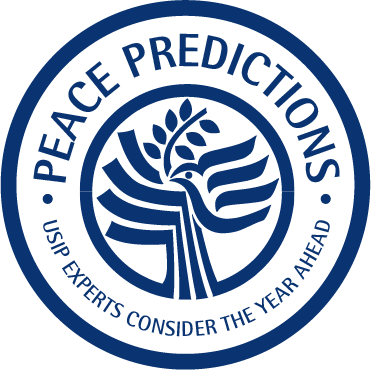Q&A: Myanmar/Burma’s 2015 Elections
Peace Predictions: USIP Experts Consider the Year Ahead
Cascades of violent conflict in Syria, Iraq, South Sudan, Ukraine and elsewhere convulsed 2014, raising anxiety about how the world will fare this year. In this series, experts from the U.S. Institute of Peace explore some of the biggest tests coming up for 2015 in the struggle to prevent or resolve violent conflict. Topics will include Myanmar/Burma’s planned parliamentary elections, Iran’s nuclear program, Nigeria’s impending national elections, Afghanistan’s new government, Pakistan’s struggle with militancy and more.

 Burma’s parliamentary elections in late 2015 will be a major test of the government’s reform program and could produce significant shifts in the country’s political landscape. Preparations can be expected to take many twists and turns in the coming months.
Burma’s parliamentary elections in late 2015 will be a major test of the government’s reform program and could produce significant shifts in the country’s political landscape. Preparations can be expected to take many twists and turns in the coming months.
Former general U Tin Aye, now head of the Union Election Commission, has announced that the voting will take place in late October or early November. The exact date will be announced 60 days ahead of time, at which point official campaigning will begin.
Priscilla Clapp, a former charge d’affaires and chief of the U.S. mission in the Burmese capital Rangoon who now works with the U.S. Institute of Peace on Burma projects, explains the import of these elections and how they’re likely to be conducted.
The big picture
What’s at stake in this election?
The results of this contest may create a new balance of power in Myanmar/Burma. The full complement of parliamentary seats at both the national and state levels will be contested, except for the 25 percent of parliamentary seats occupied by uniformed military.
The government’s Union Solidarity and Development Party (USDP), which now enjoys a huge majority, is likely to lose a large portion of its seats to the National League for Democracy (NLD), led by Aung San Suu Kyi, and to the ethnic minority parties. Once the new parliament is seated in early 2016, it will elect a new president and two vice presidents.
What will be the role of Aung San Suu Kyi?
Having been released from detention shortly after the last elections in 2010, Aung San Suu Kyi and her NLD party joined the parliament in 2012, taking 43 seats. In this year’s elections, she and her party will be contesting virtually every seat in both the national and state-level parliaments.
Winning a large portion of these seats would transform the NLD from a minor to a major – perhaps even the largest – party in parliament. Thus, although the constitution prevents her from being a candidate for president, she will become a key parliamentary leader in the next government.
The integrity of these elections will be a test of the reform process itself.
Does the military have a role in the general elections?
During the past year, more than 60 military officers were appointed to the Union Election Commission in an administrative role, meaning they will be involved in managing the elections around the country. Also, if there is any threat of violence or instability, the military may take over security, in addition to or in place of the police.
Military officers are appointed to 25 percent of the seats in both national and state-level parliaments and do not run in elections. However, in 2010, many senior military officers resigned to run for parliament as civilians. Therefore many elected members of the current parliament are former military officers, as are many senior officials in the executive branch, including the president.
How is this vote likely to compare to the last parliamentary election in 2010, which was criticized by international observers as flawed?
The 2010 elections were carefully engineered by the outgoing military government to produce an overwhelming majority of government party (USDP) representatives in the parliament. This time, the Union Election Commission has pledged to the United States and others in the international community that the 2015 elections will be free and fair.
Local monitors are being trained to cover every polling station and a large contingent of both local and international observers, who provide a different level of scrutiny, will be present. Whatever the outcome, the integrity of these elections will be a test of the reform process itself.
Election basics
How many seats are at stake?
The national parliament consists of two chambers with a total of 664 seats. Of these, 498 are filled by elected civilians and 166 are filled by military representatives appointed by the Commander in Chief. The 330 seats in the lower house (or Pyithu Hluttaw) are divided among townships. The seats in the upper house (or Amyotha Hluttaw) are organized by state and region.
What are the qualifications to run for parliament?
Candidates for parliament must be 25 years of age or older, with both parents being Myanmar citizens, and they must have resided in Myanmar for 10 consecutive years. Candidates may be either independent or a member of a duly registered political party.
How are political parties regulated?
Political parties may not contact or abet insurgent groups waging armed rebellion or persons aiming to commit terrorist acts, and they may not receive financial or other support from foreign entities nor abuse religion for political purposes.
Parties are allowed to raise money and conduct business, a privilege that has given the government’s Union Solidarity Development Party (USDP) a major advantage over its rivals, because it inherited many lucrative businesses and means of distributing government funds.



